International
Colombian government and ELN agree to create humanitarian zones
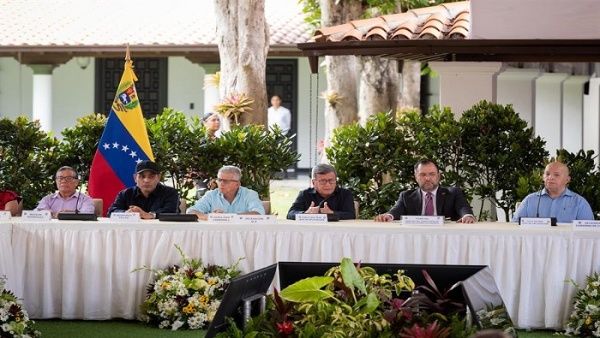
September 4 |
The Government of Colombia and the National Liberation Army (ELN) confirmed on Monday the creation of the so-called “humanitarian zones”, at the end of the fourth cycle of peace talks, which was held in Caracas, the Venezuelan capital.
The news was announced by Senator Iván Cepeda, one of the negotiators of the Colombian government, who specified that “humanitarian zones will be created in which there will be an intervention, not only of a humanitarian nature, but also through development projects that will embody many of the peace agreements that the (negotiating) table is reaching”.
In a ceremony held in Caracas, a joint declaration was released, in which the parties indicated that they will produce “humanitarian actions”, without specifying which ones, “that promote the bilateral, national and temporary ceasefire, promote the participation of the communities, peoples and other social, economic and political forces in these territories”.
Likewise, this new agreement includes humanitarian actions, with which the Government of Gustavo Petro and the ELN seek to “carry out social development projects (…) for implementation in the coming months”.
The areas chosen were Bajo Calima and San Juan, localities in the department of Valle del Cauca, as well as Sur de Bolívar (Bolívar) and Bajo Cauca (Antioquia), territory in which violent actions were registered in the last weeks, despite the bilateral ceasefire agreed, which came into force last August 3 and will be extended until February 2024.
However, the parties will be able to define new “humanitarian zones”, if necessary, after analyzing the circumstances in these territories.
At the ceremony, the main ELN negotiator, commander Pablo Beltrán, referred that “the ceasefire has been under fire” and charged against the attacks to the process, of whom he said are “against Peace”.
He also pointed out that the negotiators have “placed emphasis on dealing with the critical zones, which are areas where there have been severe attacks”.
For his part, the head of the Colombian government delegation, Otty Patiño, pointed out that “in these nine months we have achieved a cease-fire, citizen participation to build a national agreement with thousands of voices”.
Patiño pointed out that “we have initiated a process of participation that aims to be the meeting between a civil ELN and Colombian society. It is a scenario in which differences are conveyed in a frank, intelligent and non-aggressive manner that will help in the construction of a great National Agreement”.
In another intervention, Venezuelan Foreign Minister Iván Gil valued that “peace in Colombia is an urgent and necessary matter that cannot be postponed” and ratified that Caracas “is willing to host the necessary meetings”.
The main objective of this cycle, which began on August 14, was to address issues such as the bilateral cease-fire and the participation of civil society in the dialogues. The negotiators thanked the Venezuelan government for the facilities provided for this process.
International
Cardinals seek a “unifier” as they prepare for conclave to elect new pope
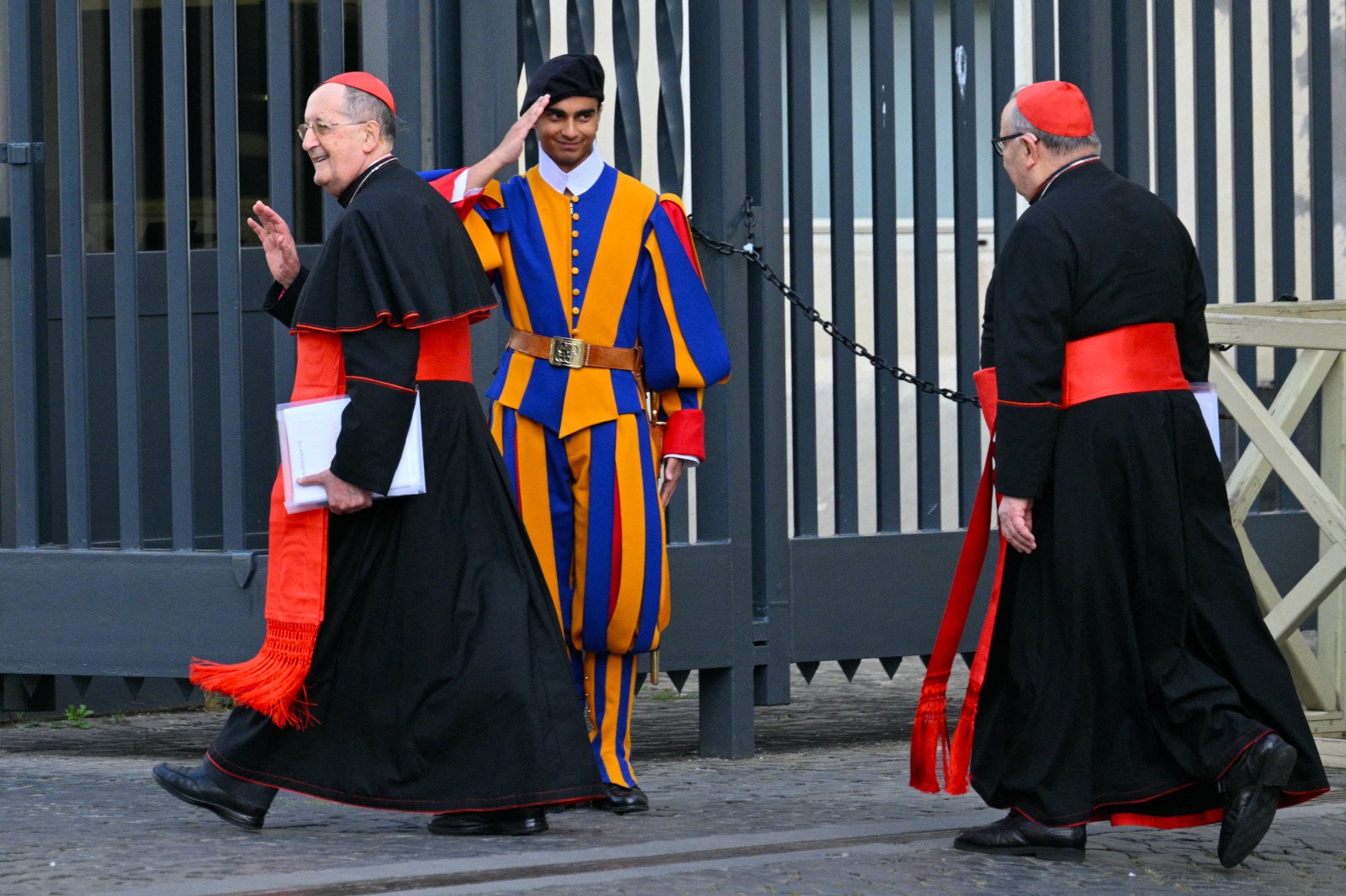
Several cardinals who will participate in the conclave to elect Pope Francis’ successor said they are approaching the mission with “apprehension,” “responsibility,” and “hope,” while also beginning to outline the profile of the next pope: a “unifier.”
The 12-year pontificate of the first Latin American pope was marked by reforms and a simple style, which earned him strong opposition from the Church’s most conservative sectors, with his predecessor Benedict XVI as a symbol of that resistance.
“The task before us these days is greater than us, and yet it is a duty we must fulfill,” summarized French Cardinal Jean-Marc Aveline during a mass in Rome on Thursday evening.
A few meters away, Luxembourg Cardinal Jean-Claude Hollerich admitted to journalists that he approaches the conclave “with a certain apprehension,” but also with “great hope.”
“We feel very small. We must make decisions for the entire Church, so please pray for us,” added the Jesuit cardinal, who was a close advisor to the Argentine pontiff.
He estimated that the conclave would “probably” begin on May 5 or 6, after the nine-day mourning period at the Vatican known as the Novendiales.
International
Trump and Zelensky hold “very productive” meeting in Rome during Pope’s funeral

Donald Trump and Volodymyr Zelensky held a “very productive” meeting, according to the White House, this Saturday in Rome on the sidelines of Pope Francis’ funeral.
No specific details about their conversation were disclosed, but the White House promised to release more information later. Zelensky’s chief of staff, Andrii Yermak, described the 15-minute discussion at St. Peter’s Basilica as “constructive.”
This was the first meeting between the U.S. and Ukrainian presidents since their heated exchange in Washington on February 28, when Trump and his Vice President JD Vance verbally confronted Zelensky in the Oval Office.
Dozens of heads of state, government leaders, and senior officials gathered in Rome on Saturday for Pope Francis’ funeral, creating opportunities for multiple diplomatic meetings.
The Ukrainian presidency stated that Trump and Zelensky “agreed to continue” their talks later Saturday in the Italian capital and shared photos of both leaders seated face-to-face, also engaging in conversation with French President Emmanuel Macron and British Prime Minister Keir Starmer.
The U.S. president said on Friday that a deal between Ukraine and Russia is “very close,” without providing details, following discussions between his envoy Steve Witkoff and Vladimir Putin in Moscow about the possibility of launching “direct negotiations” between the two sides.
International
A magnitude 6 earthquake shakes the province of Esmeraldas in Ecuador, bordering Colombia

A magnitude 6 earthquake was recorded this Friday in the coastal province of Esmeraldas, bordering Colombia, causing damage to several infrastructures and leaving, so far, 20 people injured.
According to the Geophysical Institute of the National Polytechnic School, the earthquake occurred at 06:44 local time (11:44 GMT) at 1.03 degrees south latitude and 79.69 degrees west longitude.
According to the source, the tremor occurred at a depth of 30 kilometers and 9.31 kilometers from Esmeraldas, capital of the homonymous province.
According to the National Secretariat of Risk Management (SNGR), the affected people had head injuries and bruises.
While the SNGR continues with the verification of affectations, it indicated that 80% of the electricity service and 80% of the telecommunications that were affected, are gradually restored.
Among the affected public buildings are the ECU 911 due to a fall of masonry; the Vargas Torres University, which has cracks; the Los Militares building where the front collapsed and the Prefecture building, among others.
The SNGR reported that the earthquake was felt with strong intensity in seven municipalities of the province of Esmeraldas and moderately in the provinces of Guayas and Manabí, while mildly in Carchi, Cotopaxi, Imbabura, Los Ríos, Pichincha, Santo Domingo de los Tsáchilas and Tungurahua.
About twenty minutes after the earthquake in Esmeraldas, one of magnitude 4.1 was reported in the coastal province of Guayas, located in the southeast of the country, without damage or victims having been reported so far.
The President of Ecuador, Daniel Noboa, ordered the displacement of all his ministers to Esmeraldas, in order to coordinate actions after the magnitude 6 earthquake recorded this Friday.
“I have arranged for the immediate deployment of all ministers in the province of Esmeraldas to coordinate the installation of shelters, delivery of humanitarian aid kits and assistance in everything our people need,” Noboa wrote on his social network account X.
The province of Esmeraldas was one of the most affected by the 7.8 magnitude earthquake recorded on April 16, 2016, which left more than 670 dead, thousands affected, as well as millions of material losses.
This earthquake also hit the province of Manabí, located, like Esmeraldas, on the coast of the Andean country, but also affected other areas and was felt strongly, even in the Ecuadorian capital.
Ecuador is located in the Pacific Ring of Fire or Belt, which concentrates some of the most important subduction areas (sinking of tectonic plates) in the world and is the scene of strong seismic activity.
In addition to Ecuador, the Horseshoe-shaped Belt comprises a large number of countries such as Chile, Argentina, Bolivia, Peru, Colombia, Panama, Costa Rica, Nicaragua, El Salvador, Honduras, Guatemala, Mexico, the United States and Canada.
-

 International4 days ago
International4 days agoPope Francis and Trump, a relationship of disagreements marked by migration
-

 International4 days ago
International4 days agoWithin Francis’ private wake: respect and prayer for the deceased pope
-

 International4 days ago
International4 days agoEl Salvador formalizes the proposal for the exchange of Venezuelan deportees, according to Bukele
-

 International4 days ago
International4 days agoFrom the transfer of the coffin to the funeral, three days to say goodbye to Pope Francis
-

 International4 days ago
International4 days agoTrump’s emissary will visit Russia this week for consultations on the arrangement in Ukraine
-

 International4 days ago
International4 days agoA very heterogeneous and divided conclave will elect the new pope
-

 International4 days ago
International4 days agoCardinal Becciu’s enigma: will he enter the conclave?
-

 International4 days ago
International4 days agoModi returns to India and shortens his visit to Saudi Arabia after a deadly attack in Kashmir
-

 International4 days ago
International4 days agoThe pope last called the Gaza parish on Saturday and asked about the children
-

 International4 days ago
International4 days agoA candidate for the Supreme Court denounces an unequal dispute in the judicial election of Mexico
-

 International4 days ago
International4 days agoAmerican universities and colleges sign a letter against Trump’s policy
-

 International1 day ago
International1 day ago“A dignified life” for migrants, the plea in Panama in memory of Pope Francis
-

 International4 days ago
International4 days agoThe Government of Colombia presents twelve questions that it will propose in a popular consultation to promote its reforms
-

 International4 days ago
International4 days agoBurma’s military junta extends ceasefire until April 30 due to the earthquake
-

 International4 days ago
International4 days agoInternational leaders begin to confirm their presence at Pope Francis’ funeral
-

 International2 days ago
International2 days agoThe Pope’s funeral procession through the center of Rome worries the Italian authorities
-

 International2 days ago
International2 days agoThe Arab League supports Hamas handing over control of Gaza and weapons to the Palestinian Authority
-

 International1 day ago
International1 day agoA Russian general dies in the explosion of a car bomb near Moscow
-

 International4 days ago
International4 days agoThe Peruvian Public Ministry denounces the former attorney general for an alleged corruption case
-

 International4 days ago
International4 days agoMaradona’s house arrest is again a focus of tension in the trial for his death
-

 International4 days ago
International4 days agoRoyal quinoa, the superfood that grows in front of the largest salt flat in the world in Bolivia
-

 International4 days ago
International4 days agoA judge orders the Trump Government to restore Voice of America services
-

 International4 days ago
International4 days agoDonald Trump will visit Saudi Arabia, Qatar and the United Arab Emirates in mid-May
-

 International1 day ago
International1 day agoA magnitude 6 earthquake shakes the province of Esmeraldas in Ecuador, bordering Colombia
-

 International4 days ago
International4 days agoChurch charges ceased or resigned in the papacy of Francis for cases of pedophilia
-

 International2 days ago
International2 days agoMigrants want to stay on Mexico’s southern border because of Sheinbaum’s industrial plan
-

 International4 days ago
International4 days agoThe president of the World Bank underlines his intention to lift his veto on nuclear energy
-

 International2 days ago
International2 days agoA group of the poor and a delegation of migrants will participate in the funeral and burial of the pope on Saturday
-

 International2 days ago
International2 days agoFrom email to marriage: the day Pope Francis married a Uruguayan couple
-

 International2 days ago
International2 days agoThe pope’s doctor reveals his last moments of life and that he wanted to “die at home”
-

 International4 days ago
International4 days agoMarco Rubio reorganizes the State Department to eliminate offices and jobs
-

 International1 day ago
International1 day agoPutin and Witkoff address possible direct negotiations between Russia and Ukraine
-

 International4 days ago
International4 days agoThe Brazilian Supreme Court opens trial against six others accused of leading the coup attempt
-
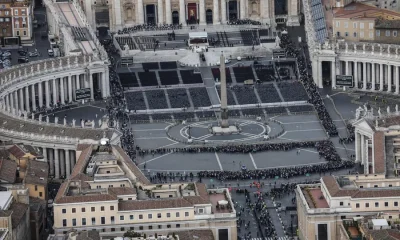
 International1 day ago
International1 day agoPreparations for Pope Francis’ funeral, in figures
-

 International1 day ago
International1 day agoPope Francis’ funeral procession will be a six-kilometer journey through the heart of Rome
-

 International4 days ago
International4 days agoA judge in the United States stops the deportation to El Salvador of a hundred Venezuelans
-

 International1 day ago
International1 day agoThe protocol for the funeral of Pope Francis, a delicate diplomatic work
-
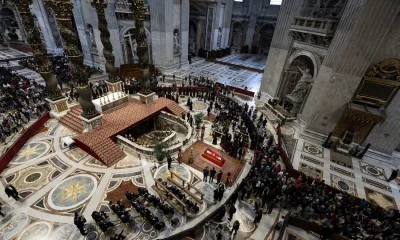
 International1 day ago
International1 day agoSocial networks, protagonists in the farewell to Pope Francis for ‘selfies’ in front of his coffin
-
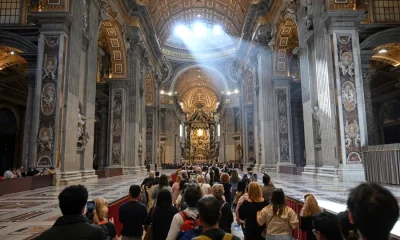
 International1 day ago
International1 day agoAbout 150,000 people say goodbye to the pope in St. Peter’s Basilica before the funeral
-

 International10 hours ago
International10 hours agoTrump and Zelensky hold “very productive” meeting in Rome during Pope’s funeral
















